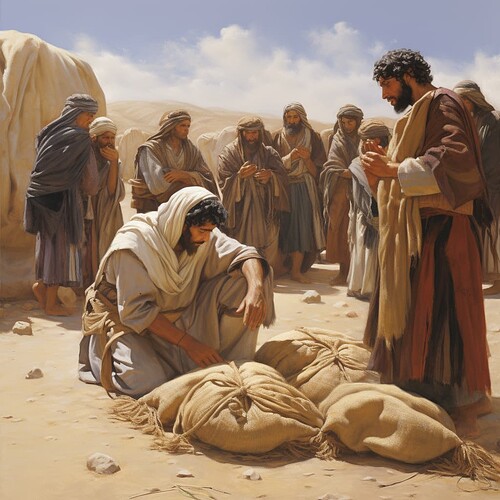 January 26: Genesis 42-43: Joseph’s Brothers in Egypt
January 26: Genesis 42-43: Joseph’s Brothers in Egypt
A Tale of Guilt, Forgiveness, and Providential Plans
 Introduction
Introduction
On January 26, we immerse ourselves in Genesis 42-43, where the saga of Joseph and his brothers unfolds further. This part of Genesis paints a vivid picture of familial relationships strained by past actions, and the unfolding of God’s plan through Joseph’s life in Egypt.
 Genesis 42: The Brothers’ First Journey
Genesis 42: The Brothers’ First Journey
In Genesis 42, Joseph’s brothers travel to Egypt to buy grain amidst a severe famine. Unbeknownst to them, they encounter Joseph, now a powerful Egyptian official. The chapter explores themes of guilt, as the brothers reflect on their past mistreatment of Joseph, and of providence, as Joseph tests their integrity.
Key Verse: “They said to one another, ‘Surely we are being punished because of our brother…’” — Genesis 42:21
 Genesis 43: The Second Journey
Genesis 43: The Second Journey
Genesis 43 narrates the brothers’ second journey to Egypt, this time with Benjamin, as per Joseph’s demand. The dynamics of family, trust, and the fear of losing another son, as expressed by Jacob, highlight the emotional complexity of the narrative.
Key Verse: “And may God Almighty grant you mercy before the man so that he will let your other brother and Benjamin come back with you…” — Genesis 43:14
 Key Themes and Reflections:
Key Themes and Reflections:
Guilt and Repentance: The brothers’ realization of their guilt concerning Joseph signifies the first step towards repentance and reconciliation.
Providence and Testing: Joseph’s actions, while seemingly harsh, are part of a greater plan to test his brothers’ character and integrity.
Family Dynamics: The narrative delves deep into the complexities of family relationships, highlighting the pain of past actions and the longing for reconciliation.
 Today’s Application:
Today’s Application:
Reflect on the impact of past actions on our relationships and the importance of forgiveness and reconciliation. Consider how God’s providence often works through complex and difficult situations in life.
 Hidden Gem:
Hidden Gem:
Did you know? The silver cup Joseph plants in Benjamin’s sack (Gen 44) is not just a test but a symbol of Joseph’s own experience – valuable but ensnared by circumstances.
 Reflective Q&A:
Reflective Q&A:
![]() Genesis 42-43: Joseph and His Brothers
Genesis 42-43: Joseph and His Brothers
![]() Understanding Guilt and Forgiveness: How do Joseph’s brothers’ feelings of guilt guide them towards forgiveness and redemption?
Understanding Guilt and Forgiveness: How do Joseph’s brothers’ feelings of guilt guide them towards forgiveness and redemption?
A: The brothers’ guilt serves as a catalyst for introspection and change, paving the way for future reconciliation. It shows that acknowledgment of wrongdoing is essential for healing and forgiveness.
![]() Providence in Hardships: How do these chapters demonstrate God’s providence working through difficult circumstances?
Providence in Hardships: How do these chapters demonstrate God’s providence working through difficult circumstances?
A: The story of Joseph and his brothers illustrates that even in hardship and suffering, there can be a divine purpose. It teaches us to look beyond immediate challenges and trust in God’s overarching plan.
 Join the Discussion:
Join the Discussion:
Reflect on times when you have faced difficult situations. How do you see God’s providence in your life’s journey? Share your thoughts and experiences in the comments below!
#JosephAndHisBrothers #Forgiveness #FamilyDynamics #BibleStudy #SpiritualJourney #GenesisReading
![]() See You Tomorrow in Genesis: Continue your enlightening journey with us as we explore more of Joseph’s story and the intricate plans of God in the lives of His people.
See You Tomorrow in Genesis: Continue your enlightening journey with us as we explore more of Joseph’s story and the intricate plans of God in the lives of His people.
 Join the forum!
Join the forum!
Join our AIgniteScripture Community for a deeper exploration of biblical themes and personal growth.
